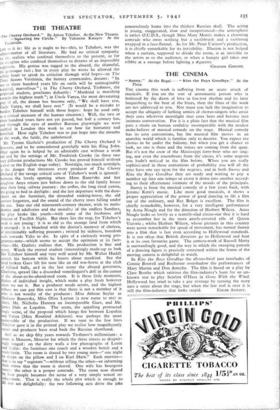THE CINEMA
" Sunny." Plaza. At the Regal.-- " Kiss the Boys Goodbye." At the
THE cinema this week is suffering from an acute attack of musicals. If you are the sort of unromantic person who is bothered by the dawn of love in fox-trot rhythm and its later languishing to the beat of the blues, then the films of the week are not addressed to you. Nor must you lack the imagination to accept the ubiquity of lurking armies of chorus-singers who await their cues wherever moonlight may coax hero and heroine into intimate conversation. For it is a plain fact that the musical film puts a strain on human credulity incomparable with the modest make-believe of musical comedy on the stage. Musical comedy has its cosy conventions, but the musical film moves in an anarchic world which is familiar only to deceive. You expect the chorus to be under the balcony, but when you get a chance to look, no one is there and the voices are coming from the quay. But it's not the crew of the Mississippi ferry-boat who are sing- ing, nor even the roustabouts from the circus, it's some negroes you hadn't noticed in the film before. When you are really sophisticated in these contortions of probability you will all the time have one eye open for the negroes, and in both Sunny and Kiss the Boys Goodbye they are ready and waiting to pep a number up into one tempo or croon it down into another accord- ing to their affectionate estimate of the moods of the principals.
Sunny is from the musical comedy of a few years back, with Jerome Kem's music. Like most good musicals, it shows a proper appreciation of the power of good dancing to lift a film out of the ordinary, and Ray Bolger is excellent. The film is chiefly remarkable, however, for a very intelligent performance by Anna Neagle and for the direction of Herbert Wilcox. Anna Neagle looks so lovely as a scantily-clad circus-star that it is hard to remember her in the more amply-covered role of Queen Victoria ; whilst Herbert Wilcox, whose pictures in this country were never remarkable for speed of movement, has turned Sunny into a film that is fast even according to Hollywood standards. It is not often that British directors go to Hollywood and beat it at its own favourite game. The camera-work of Russell Metty is outstandingly good, and the way in which the sweeping pattern of a dancing figure is precisely contained within the frame of the moving camera is delightful to watch.
In Kiss the Boys Goodbye the all-too-brief jazz interludes of Connie Boswell and Rochester overshadow the performances of Mary Martin and Don Ameche. The film is based on a play by Clare Boothe which satirises the film-industry's hunt for an un- known star to play Scarlett O'Hara in Gone With the Wind. Hollywood has tried to take a gay revenge by turning the story into a satire about the stage, but when the last reel is over it is
still the film-industry that looks stupid. EDGAR ANSTEY.


























 Previous page
Previous page